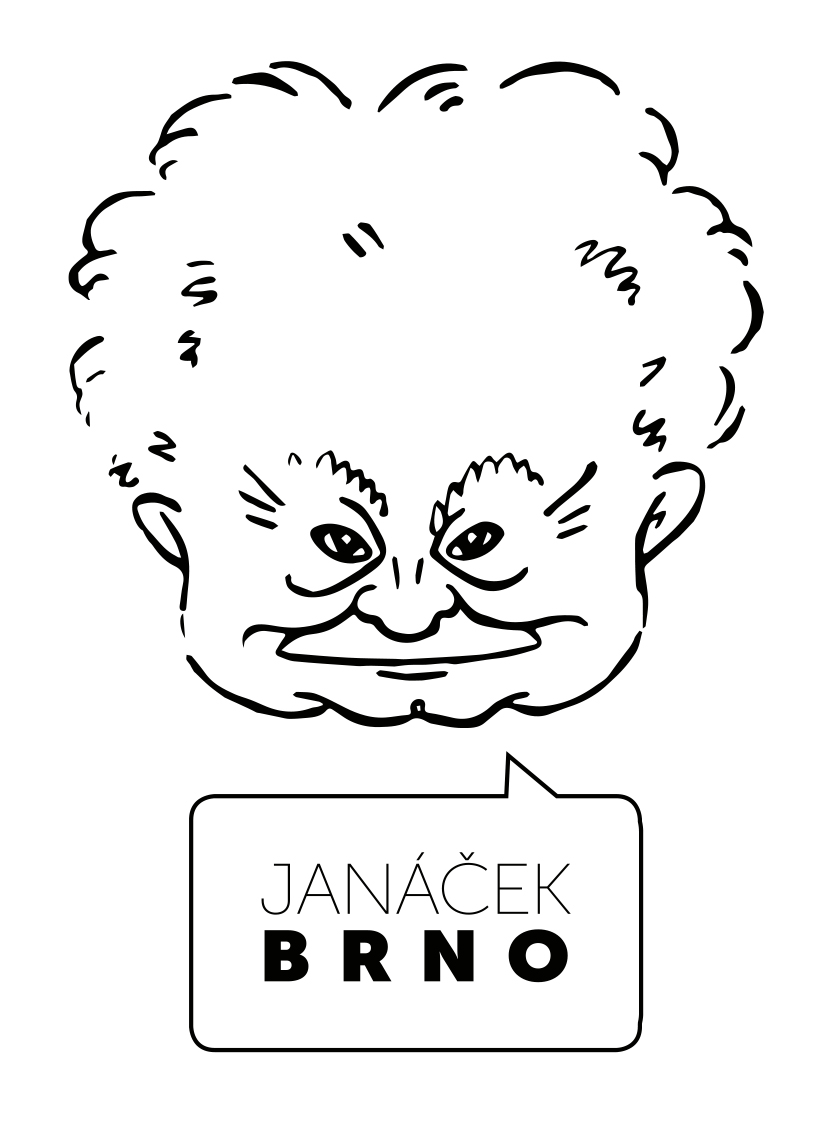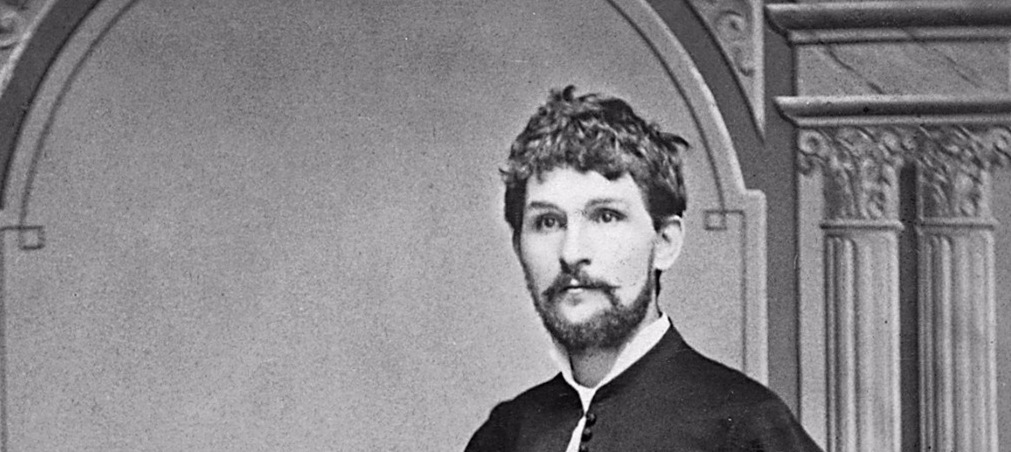
WHAT WAS JANÁČEK LIKE
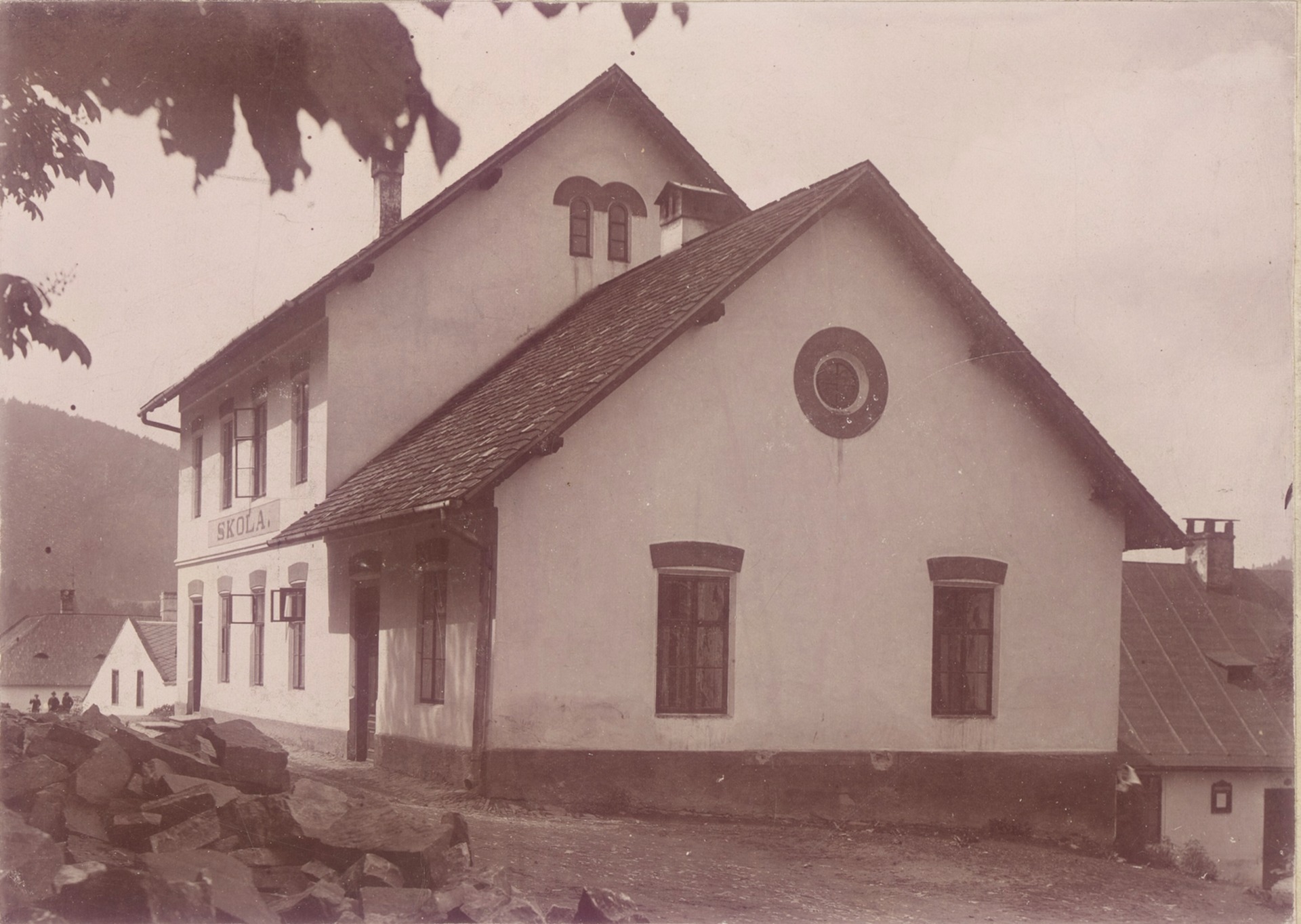
When thinking about Janáček's personality, we must return to his childhood. Janáček was born deep in the nineteenth century into a teacher's family in Hukvaldy. That would not be such a hopeless position if his father did not teach in a particularly poor region. The very poor social situation, bordering on poverty, was exacerbated mainly by the large number of children and the progressive illness of the sole breadwinner, the father Jiří Janáček. In the case of Leoš, the lack of funds for education was solved by his departure to the charity school foundation of the Augustinian monastery in Old Brno. It must have been quite hard for him, at least at first, when, as an eleven-year-old boy, he found himself separated from his family, in a foreign and not entirely friendly environment. It is necessary to realize that at the same time it was the environment of an exclusively male world. Charity children, monks, classmates and teachers - without the influence and counterweight of maternal love or at least contact with their sisters. Shortly after Janáček's arrival in Brno, his father, his only childhood authority, died. Here we could probably look for the beginnings of Janáček's lifelong effort to empathize and understand the female psyche, as well as his complicated private relationship with women.
Although he was a rather average student, his star began to rise immediately after his graduation from the Slavonic Institute for the Education of Teachers. His reputation in the minority Czech Brno society continued to grow, and by the beginning of the 1880s he had achieved a significant social rise. Janáček's initial position as a poor singer in the Augustinian foundation in Old Brno had changed a lot in just ten years.
At the age of 18, in 1872, he obtained the post of
deputy choirmaster at the Basilica of the Assumption of the Virgin Mary in Old
Brno, from 1876 he worked as a music teacher at the teachers' institute, he
briefly taught at the Czech Institute for Teacher Education in Brno and taught
singing at the Czech grammar school in Brno. In addition to his educational
efforts, he was active as a choirmaster; from 1873 in Řemeslnická beseda
Svatopluk and from 1876 in the Philharmonic Society of Beseda brněnská, the
most important Czech music ensemble in Moravia. As choirmaster and conductor,
Janáček introduced the tradition of large vocal orchestral concerts in Czech
Brno, which until then were solely the domain of the German majority. He was
also active as a piano virtuoso and an organizer of chamber and symphony
concerts. It is worth mentioning that it was his activity in these associations
that enabled young Janáček to gain important connections among the Czech elite
in Brno.
Zdeňka Janáčková in 1892 © Moravian Museum
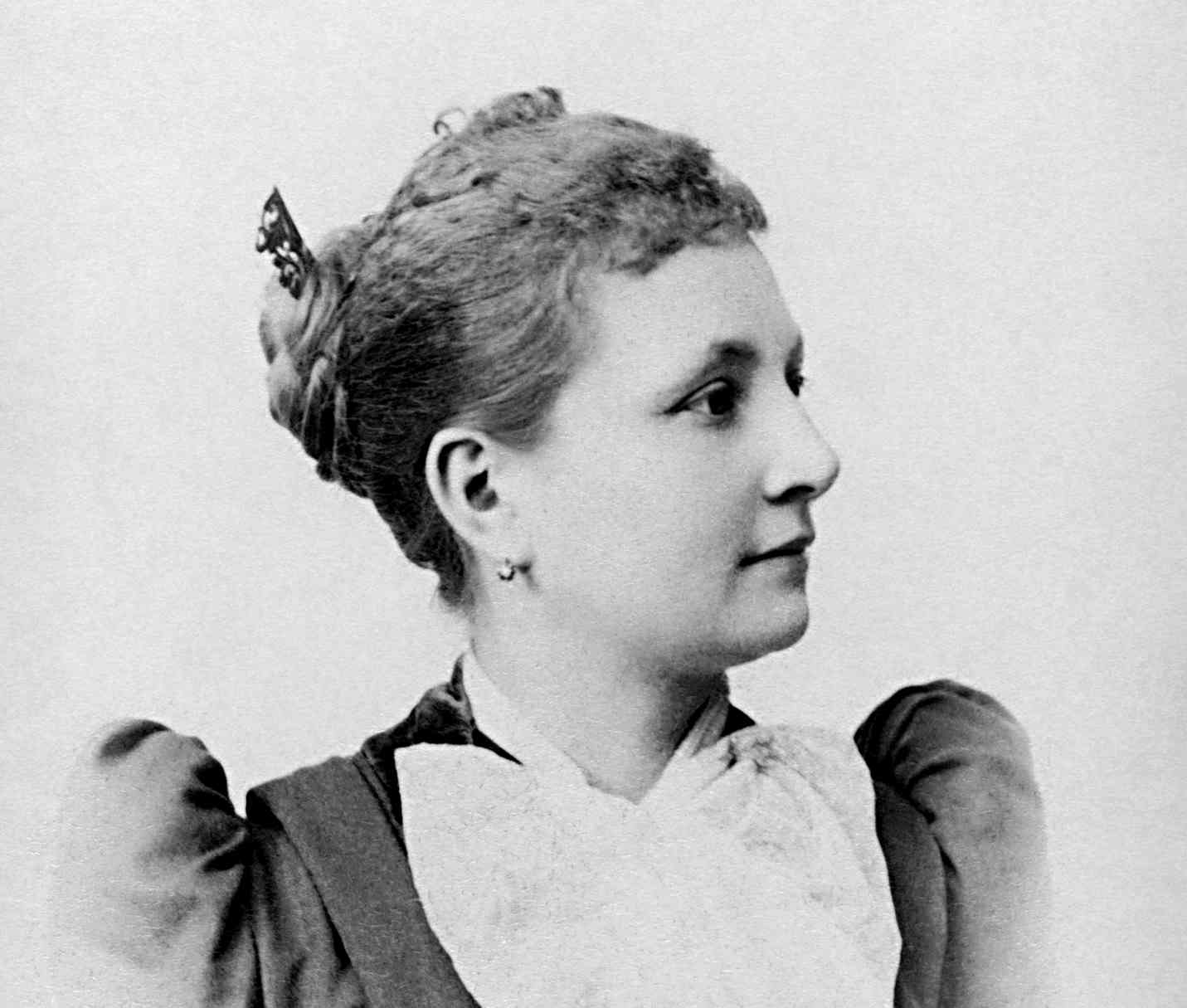
His
marriage to Zdeňka Schulzová in 1881, the daughter of the director of the
teachers' institute, Emilian Schulz, also helped him socially. Furthermore,
Janáček began to establish himself as a composer, especially in the field of
choral music. If we add to all his activities the establishment of the organ
school in 1881, which under Janáček's leadership soon developed into a leading
music school in Moravia, as well as the publication of Hudební listy, it is
understandable that Janáček was a recognized and prominent cultural figure in
Brno of the mid-1880s, who was known beyond the borders of the region. This
testifies to his excellent organizational and artistic abilities, as well as
the huge ambition that could be found in the young Janáček.
However,
he was not yet recognized as a composer. This came after the Brno première of
Jenůfa in 1904. We can only speculate to what extent this recognition was real.
The tumultuous reception of the opera was, to a certain extent, a kind of
demonstration of "Moravian" music in opposition to the dismissive attitudes of
Prague. However, Brno did not really show much interest in Janáček as a
composer, he was still perceived more as the director of the organ school and a
kind of compositional eccentric, which is also evident from the fact that,
until 1916, Jenůfa appeared on the stage only 18 times at the Brno Czech
National Theatre. Janáček, as a composer, largely lost his trust in himself.
This was mainly caused by his repeated rejection by Prague's artistic circles.
He was perceived as an ambitious young man of strange opinions, who basically
despised the work of the national composer Bedřich Smetana and, on the other
hand, uncritically admired the "man-of-the-world" Antonín Dvořák, whose
position in Czech society at that time was largely ambiguous and problematic.
In this way, he provoked important figures of the Prague music scene,
especially those around Zdeněk Nejedlý. It is no wonder that until 1916, when
Jenůfa had its successful première at the National Theatre in Prague, Janáček's
work was basically overlooked and even caricatured. Janáček certainly had a
complex regarding this fact, as it is clear from his letter from June 1916,
after the Prague première, in which he writes to J. B. Foerster:
I
didn't believe anyone would ever notice. I was smitten - my own students have already
started to advise me how to compose, to speak with an orchestra.
From a letter to Josef Bohuslav Foerster (24. 6. 1916)
Real self-confidence and societal recognition actually came into being only after the première of Jenůfa at the Vienna Court Opera in 1918 and after Max Brod advocated for Janáček's work.
Janáček's notes kept in his copy of Helmholtz's Lehre
von den Tonempfindungen als physiologische Grundlage für die Theorie der Musik
© Moravian Museum
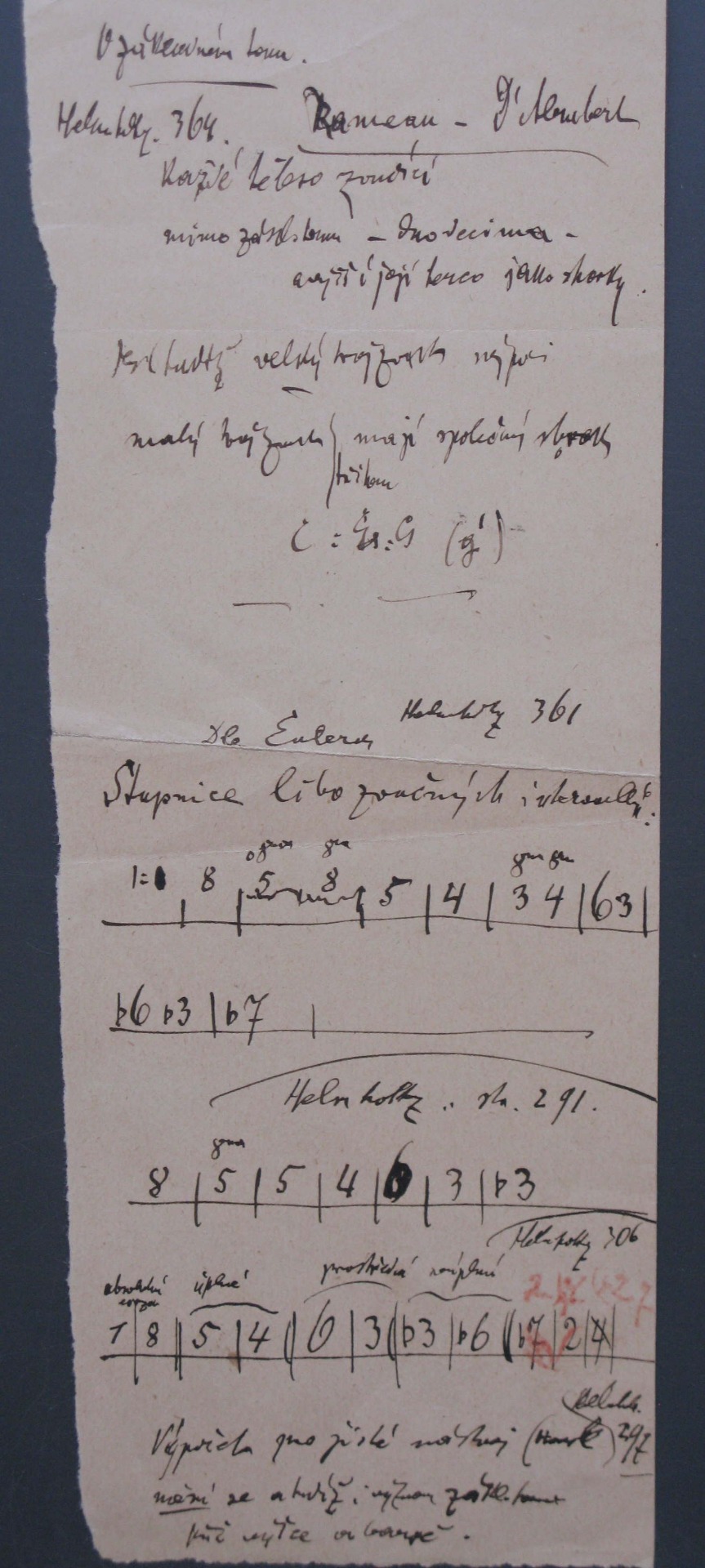
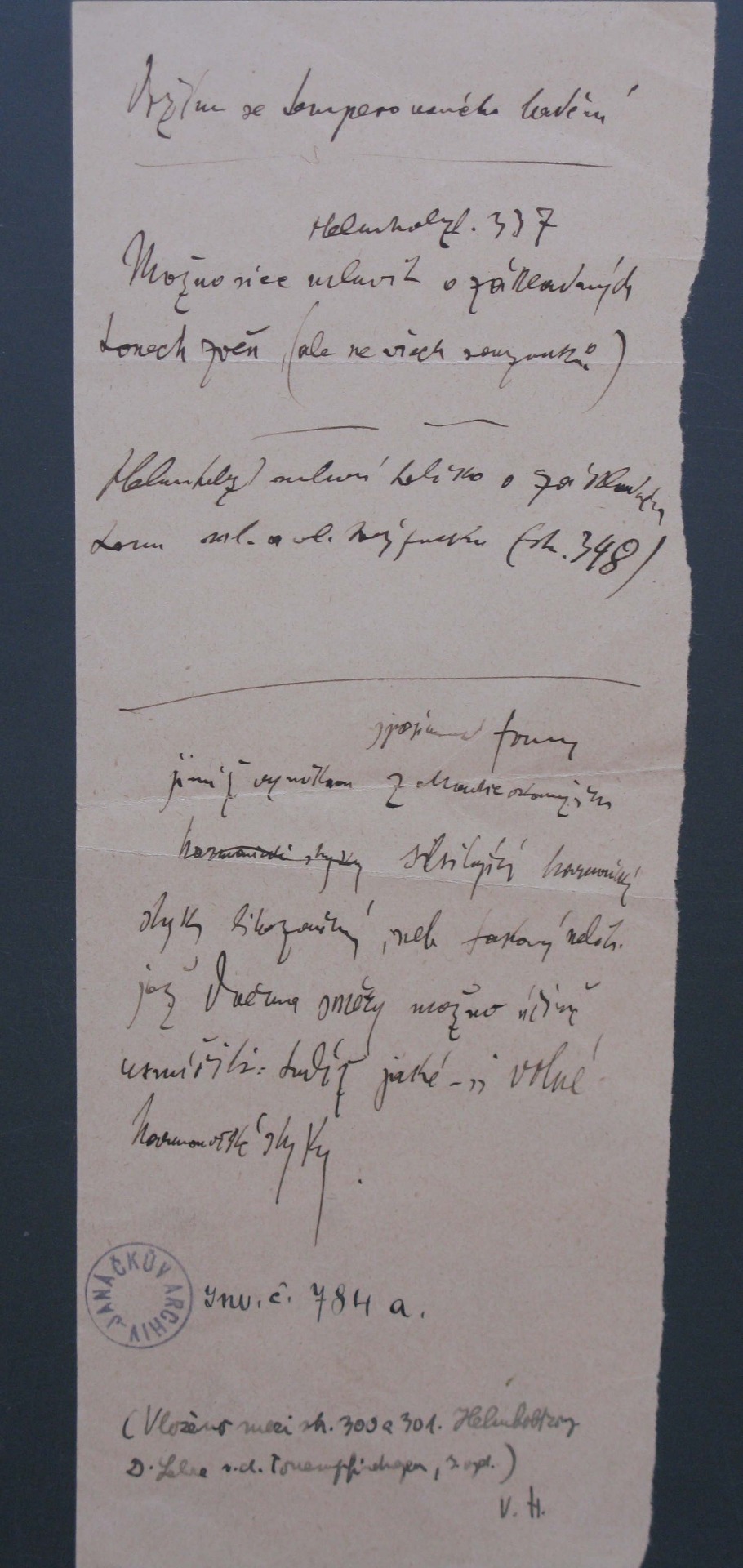
Another
important aspect of Janáček's personality was his extraordinary education. At
the age of twenty, he read and studied Josef Durdík's formal aesthetics, which
in many ways influenced his attitudes and opened the door to professional
literature, whether aesthetic, psychological, linguistic, ethnographic,
musicological or philosophical. The hundreds of volumes in Janáček's library
included, besides fiction, books such as Helmholtz's Lehre von den
Tonempfindungen als physiologische Grundlage für die Theorie der Musik,
Masaryk's Základové konkretní logiky. Třídění a soustava věd, Wundt's Grundzüge
der physiologischen Psychologie, Zimmermann's Allgemeine Aesthetik als
Formwissenschaft, Harmonielehre by Arnold Schönberg or many papers by Hugo
Riemann, Otakar Hostinský or Zdeněk Nejedlý. Most of the books are thoroughly
annotated by Janáček, that is, demonstrably studied. Janáček's language skills
are related to this - he spoke excellent German, good Russian and learned
French in his youth.
Janáček's religious, political and national thinking is certainly of considerable importance as well. We will not comment on the composer's relationship with God, but his relationship with the church can be documented. Although he was raised in a monastery, ran the Old Brno choir for twenty years and, as a child, passionately experienced Moravia's distinctive devotion to Saints Cyril and Methodius, he was not a practising Catholic and his attitude towards the church was cold. This can be demonstrated with a quote from a letter from 1926:
The
organ is the most insensitive musical instrument; therefore it roars in the
churches.
From a letter to Jindřich Cenk (31. 10. 1926)
We are not informed in detail about Janáček's political views, we only know that he was briefly a member of the Czechoslovak National Democracy in the 1920s, from which he resigned for its anti-Masaryk attitudes in 1927. More is known about his ethnic attitudes, which are often superficially perceived as strongly nationalistic. However, this does not correspond to the contemporary context. First of all, it is necessary to realize that Janáček is generationally related to Masaryk and shares with him an opinion in the understanding of humanitarian and national issues. Affinity with the Slavic peoples and caution regarding the Pan-German question were simply part of the agenda in the second half of the nineteenth century. Janáček was uncompromising on the German issue and this was no wonder, considering his experience from Brno, where the majority of inhabitants were German.
Tensions between Czechs and Germans were evident in Brno since the second half of the nineteenth century, when the emancipation process of the Czech minority began to develop in the city. However, the culmination of hostility between the two nationalities came at the beginning of the twentieth century, especially regarding the issue of Czech higher education, which the Brno Germans resisted by all means. The Czechs had their streets in Brno with their shops and cafes, just like the Germans - but Janáček did not frequent the latter out of principle. He even stated that he would never enter the Brno German House and probably never did, even though top concerts were performed there.
Max Brod (1884-1968) © Moravian Museum
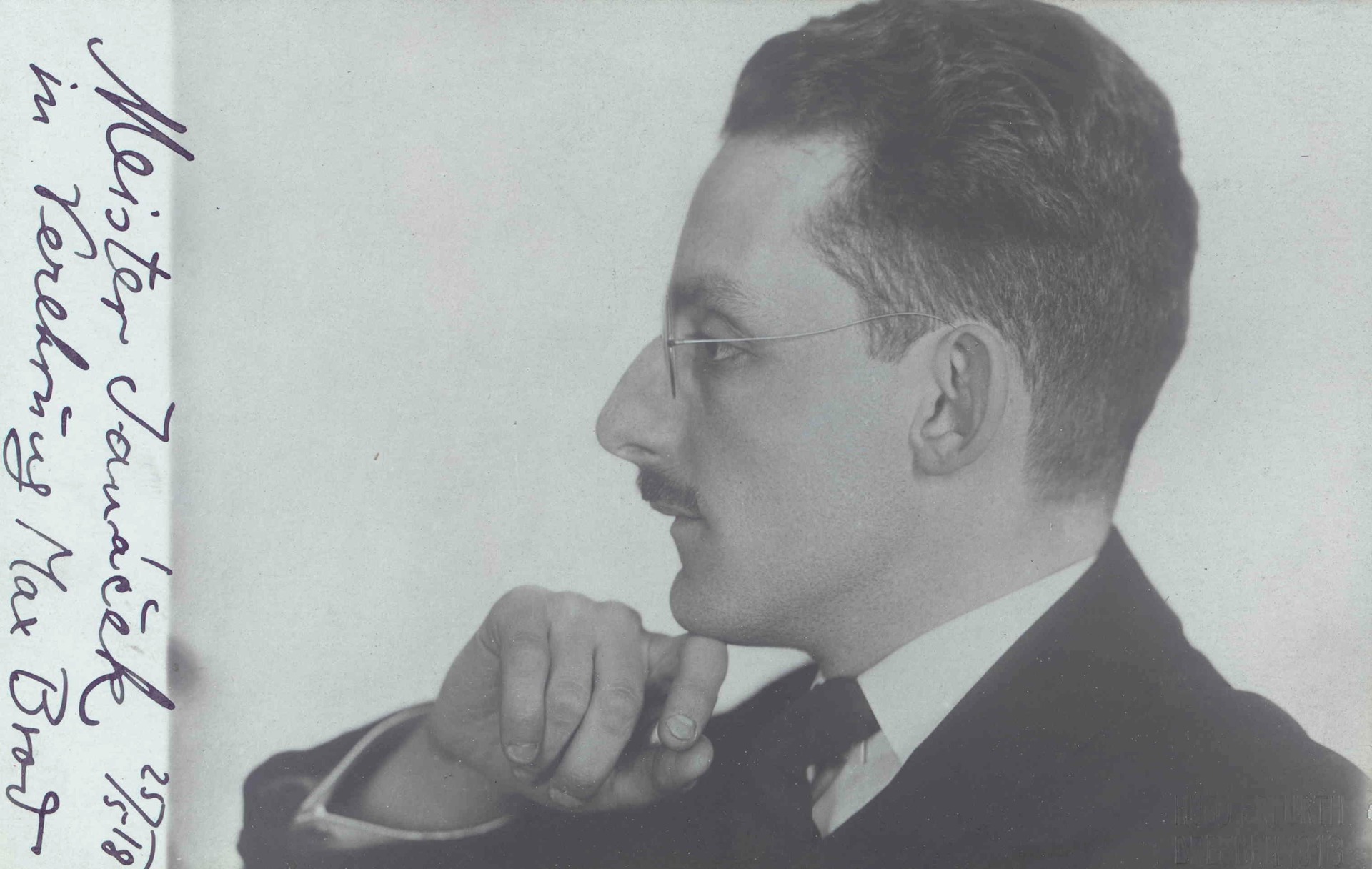
The situation calmed down only after the politically aggravated times surrounding 28 October 1918 and after the handover of the German City Theatre (today's Mahen Theatre) to the Czech National Theatre in mid-1919, in which Janáček actively participated. His sometimes misinterpreted acute anti-German attitude was thus due to his bad experience with Brno's national conditions.
On the other hand, it should be noted that one of his great friends and promoters was the German writer Max Brod and his court publisher was the Vienna publishing house Universal Edition.
Another aspect was Janáček's social empathy. In addition to his humanistic attitudes, which somehow belonged to the good upbringing of the Czech intellectual elite, we can observe a certain emotional commitment to the socially oppressed in Janáček, from various perspectives. This is certainly due to Janáček's interest in psychology and the obsessive recording of so-called speech melodies, which in many cases are basically phonetic records of emotionally tense situations, of mostly ordinary people. In this way, Janáček was looking for ways to delve under the surface of the human psyche. Here, his motivation is important - namely, his interest in man as a unique individuality and the study of emotionally strong moments. Incidentally, this also helps answer the question of Janáček's affection for Russian literature. Janáček's "Russophilism" is basically limited to his knowledge of the language and his admiration for Russian literature. The fact that he emphasizes the work of Dostoevsky, Ostrovsky and Tolstoy is a picture of his fascination with human characters and the psychology of the individual. This interest emphasizes the humanitarian attitudes present in the society of that time (let us recall at least Masaryk's work on Dostoevsky).
Olga Janáčková in 1899 © Moravian Museum

The second reason for Janáček's increased empathy with people tested by fate was the personal experience of an emotionally impoverished childhood and, above all, the personal tragedy of the loss of both his children. This fact hit Janáček hard. His little son Vladimír died at the age of two, his daughter Olga at the age of 21. After Vladimír's death, Janáček became completely attached to his only living child - Olga. This bond was strengthened by Olga's health issues. For Janáček, Olga had undoubtedly become the only certainty and meaning of his life. It is after her death that we observe Janáček's increased sensitivity to the personal tragedies of people around him and the reflection of this fact in his work.
At the
same time, however, we observe in Janáček that he probably had difficulty
establishing deeper friendships and emotionally engaged relationships. The only
real friend in the composer's life, a classmate and colleague from the
teachers' institute, Berthold Žalud, died young, and with him the only person
whom the composer fully trusted and confided in. Janáček gained many
acquaintances and friends during his life, but he did not find a close personal
friend again. He was basically closer only to his former classmates. Even his
wife Zdeňka was not a person to whom he would confide in and express his
feelings to. His late-life muse Kamila Stösslová became such a close person to
him, in whom the position of a close friend and a beloved being was combined.
And believe me, Kamila, there were no more beautiful days in my life than those spent with you. I felt a pure friendship, it presented itself simply and warmly. You were like an open window: through it one could see everything just as it was. I had nothing to hide, it was so peaceful and pleasant in my soul. [...] And that's why in your company there was always a smile on our faces between us. I was amongst good people, which is why I remember it so fondly and like you so much. My life is sadder, more disordered, which is why I bind it with this 'art' of mine, I harvest it and in my imagination make it more tolerable. Who knows, if fate had brought us together, whether I would have needed my art, whether it would have made its presence felt within me? Whether in your eyes which look on so sincerely there wouldn't have been a whole world for me?
From a letter to Kamila Stösslová (20. 8. 1924)
Finally,
perhaps an indirectly related topic, which, however, speaks volumes. And that
is the issue of finances. Janáček had been decently financially secured as a
teacher since the 1880s, but he became wealthy only after 1920 as a professor
at the Master School of the Prague Conservatory and, above all, thanks to
royalties. However, he was always financially modest and, if possible, helped
his family and friends. In his opinion, he was very careful when spending
money, even though he had no direct successors and heirs. In reality, however,
his business naivety was misused by everyone around him, from his family, his
acquaintances, to Mr. and Mrs. Stössl. Many of the things he had bought on recommendation
as a "good bargain" turned out to be more or less worthless trinkets or
overvalued real estate and land after his death.
Leoš Janáček in 1923 © Moravian Museum

We would have to carry out a number of such probes in order to be able to compile at least an approximate mosaic of Janáček's personality. Nevertheless, we can state at least the following: Janáček was very intelligent, educated, hard-working, ambitious, organizationally capable and emotionally minded, but with a limited ability to express his feelings. Testimonies show that he was choleric and uncompromising, other sources depict him as being able to make certain compromises. He could be funny and helpful in communication, but often also explosive and sharp. He did not let anyone get too close, he was therefore also an introvert and to a large extent a solitary man. He struggled with the question of human demise; for his own part, he simply erased this question from his life and did not intend to talk about it at all. He was not especially generous. He could not forgive people who had crossed his path, nor did he know much about the concept of gratitude.
On the other hand, he was very sensitive to human hardships and misery. One would say that, overall, the character of his personality was by no means exceptional. However, he was different in one aspect: his ability to write music that is among the best of what the twentieth century has to offer.
Text by Jiří Zahrádka. Extracts from the publication Famous Czech Composers. Published by the National Museum, 2020.
